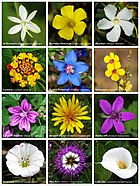Arecales
| Arecales Temporal range: Late Cretaceous - Recent
| |
|---|---|

| |
| Areca catechu | |
| Scientific classification | |
| Kingdom: | Plantae |
| Clade: | Tracheophytes |
| Clade: | Angiosperms |
| Clade: | Monocots |
| Clade: | Commelinids |
| Order: | Arecales Bromhead |
| Families | |
| Diversity | |
| 206 genera | |
Arecales is an order of flowering plants. The order has been widely recognised only for the past few decades; until then, the accepted name for the order including these plants was Principes.
Taxonomy[]
The APG IV system of 2016 places Dasypogonaceae in this order, after studies showing Dasypogonaceae as sister to Arecaceae.[1] However, this decision has been called into question.[2]
Historical taxonomical systems[]
The Cronquist system of 1981 assigned the order to the subclass Arecidae in the class Liliopsida (= monocotyledons).
The Thorne system (1992) and the Dahlgren system assigned the order to the superorder Areciflorae, also called Arecanae in the subclass Liliidae (= monocotyledons), with the single family Arecaceae.
The APG II system of 2003 recognised the order and placed it in the clade commelinids in the monocots and uses this circumscription:
- order Arecales
- family Arecaceae, alternative name Palmae
This was unchanged from the APG system of 1998, although it used the spelling "commelinoids" instead of commelinids.
References[]
- ^ Angiosperm Phylogeny Group (2016), "An update of the Angiosperm Phylogeny Group classification for the orders and families of flowering plants: APG IV", Botanical Journal of the Linnean Society, 181: 1–20, doi:10.1111/boj.12385
- ^ Givnish, Thomas J.; Zuluaga, Alejandro; Spalink, Daniel; Soto Gomez, Marybel; Lam, Vivienne K. Y.; Saarela, Jeffrey M.; Sass, Chodon; Iles, William J. D.; de Sousa, Danilo José Lima; Leebens-Mack, James; Chris Pires, J.; Zomlefer, Wendy B.; Gandolfo, Maria A.; Davis, Jerrold I.; Stevenson, Dennis W.; dePamphilis, Claude; Specht, Chelsea D.; Graham, Sean W.; Barrett, Craig F.; Ané, Cécile (November 2018). "Monocot plastid phylogenomics, timeline, net rates of species diversification, the power of multi-gene analyses, and a functional model for the origin of monocots". American Journal of Botany. 105 (11): 1888–1910. doi:10.1002/ajb2.1178. PMID 30368769.
External links[]
 Data related to Arecales at Wikispecies
Data related to Arecales at Wikispecies- NCBI Taxonomy Browser
| Wikimedia Commons has media related to Arecales. |
- Arecales
- Angiosperm orders
- Late Cretaceous plants
- Extant Campanian first appearances
